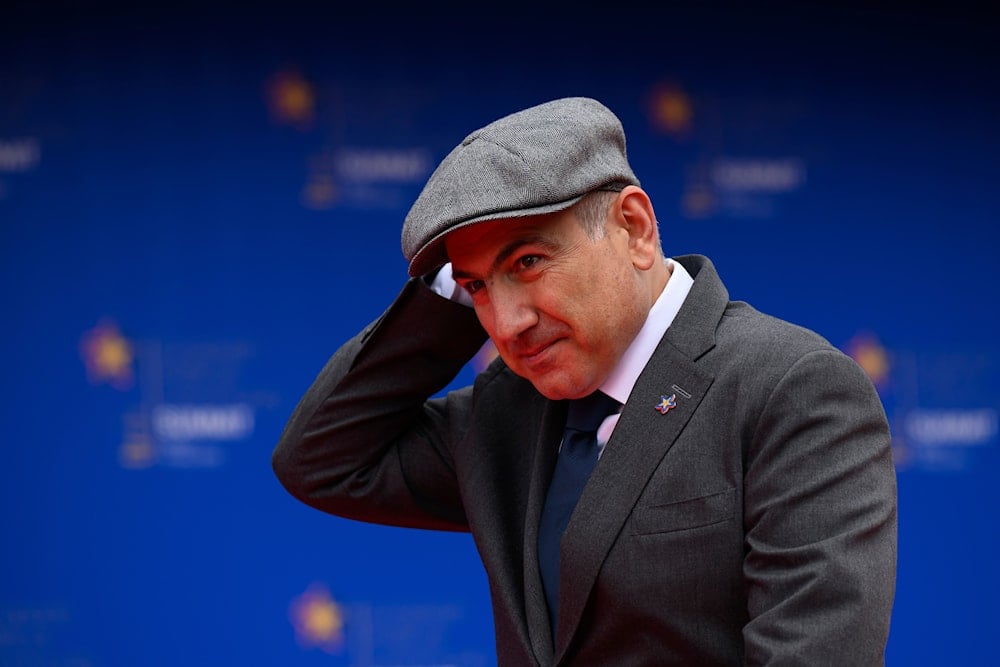Armenian PM says coup plot involving senior cleric thwarted
Authorities accuse Archbishop Bagrat Galstanyan of plotting to seize power using unconstitutional methods, as church-state tensions escalate in Armenia.
-

Armenian Prime Minister Nikol Pashinyan arrives for the European Political Community summit in Tirana, Albania, Friday, May 16, 2025. (AP)
Armenian Prime Minister Nikol Pashinyan announced on Wednesday that security forces had foiled a coup attempt allegedly involving a prominent cleric, escalating his long-running standoff with the Armenian Apostolic Church.
According to a statement posted on his official Telegram channel, Pashinyan claimed that law enforcement had disrupted “a large-scale and sinister plan" to "destabilize the situation in the Republic of Armenia and seize power."
Tensions between the government and the Church have been simmering since Armenia’s 2020 defeat in the Nagorno-Karabakh war. Catholicos Garegin II, the Church’s spiritual leader, has repeatedly called for Pashinyan’s resignation since then, criticizing his handling of national security and territorial concessions.
The latest confrontation centers on Archbishop Bagrat Galstanyan, a senior cleric and leader of the opposition Sacred Struggle movement. Galstanyan had led mass demonstrations last year against Pashinyan’s policies, accusing him of ceding Armenian land to Azerbaijan. While those protests did not succeed in unseating the prime minister, authorities now allege the archbishop pursued unconstitutional means to seize power.
Authorities allege terrorist intent
In a statement released by the Investigative Committee, Galstanyan was accused of initiating efforts “since November 2024” to change Armenia’s leadership through methods not sanctioned by the constitution. The agency further claimed that Galstanyan, “with the prior consent of several members of the movement, acquired the necessary means and tools to carry out terrorist acts and seize power.”
Searches were reportedly conducted at the homes of the archbishop and approximately 30 of his associates.
While no formal charges had been announced at the time of reporting, the case marks a significant escalation in the standoff between the government and Church-backed opposition groups.
MP Garnik Danielyan, a close ally of Galstanyan, dismissed the allegations as politically motivated, labeling the investigation “a tactic of a dictatorial regime.” He asserted that the charges were fabricated and designed to suppress dissent.
Armenia remains deeply divided in the aftermath of Azerbaijan’s 2023 recapture of Karabakh, a development that triggered a national reckoning over sovereignty, security, and the direction of peace negotiations. The fallout has eroded confidence in government institutions and fueled political unrest.
A deeper institutional rift
Earlier this month, Pashinyan intensified his feud with the Armenian Apostolic Church by publicly calling on followers to remove Catholicos Garegin II from his post. During a heated exchange, the prime minister went so far as to accuse the religious leader of fathering a child, an allegation that provoked outrage among Church supporters and prompted calls for Pashinyan’s excommunication.
The Armenian Apostolic Church continues to wield considerable influence in the country’s cultural and political life. Recognized as the spiritual foundation of Armenia, widely known as the first nation to adopt Christianity as a state religion in the 4th century, the Church occupies a unique position under the constitution.
The alleged coup plot and the wider clash between Church and state now threaten to further destabilize an already polarized political landscape.
Read next: Armenia transfers four border villages to Azerbaijan

 3 Min Read
3 Min Read









